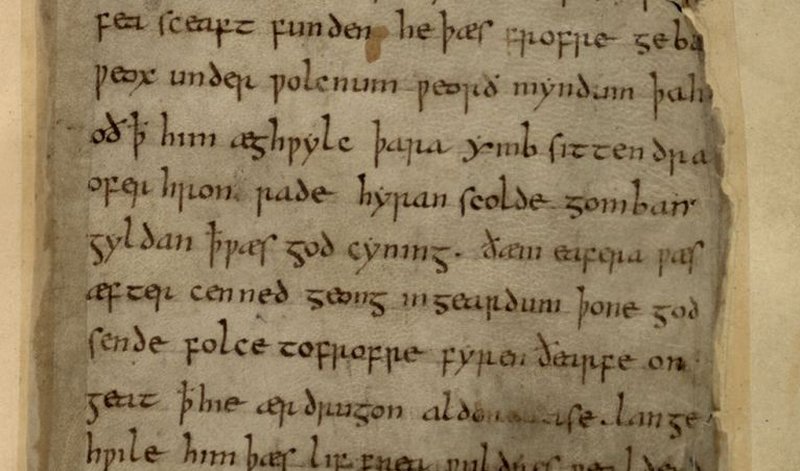Conny Waters - AncientPages.com - “Beowulf,” a famous epic poem about a Danish hero’s quest to kill Grendel was long debated by scholars. “Beowulf” represents a very complex example of Old English literature.
Did one single author write it or was it composed from several sources?
Epic poem about a Danish hero’s quest to kill Grendel was long debated. Image credit: The British Library via Smithonian.com
Researchers led by Madison Krieger, a post-doctoral fellow at the Program for Evolutionary Dynamics and Joseph Dexter, who received a Ph.D. from Harvard, used a statistical approach known as stylometry (a method of analyzing everything from the poem's meter to the number of times different combinations of letters show up in the text).
"We looked at four broad categories of items in the text," Krieger said. "Each line has a meter, and many lines have what we call a sense pause, which is a small pause between clauses and sentences similar to the pauses we typically mark with punctuation in Modern English. We also looked at aspects of word choice."
"But it turns out one of the best markers you can measure is not at the level of words, but at the level of letter-combinations," he continued. "So we counted all the times the author used the combination 'ab', 'ac', 'ad', and so on."
Using those metrics, Krieger said in a press release, the team combed through the Beowulf text, and found it to be consistent throughout -- a result that lends further support to the theory of single authorship.
"Across many of the proposed breaks in the poem, we see that these measures are homogeneous," Krieger said. "So as far as the actual text of Beowulf is concerned, it doesn't act as though there is supposed to be a major stylistic change at these breaks. The absence of major stylistic shifts is an argument for unity."
The study is just the latest effort to pin down Beowulf's often-mysterious background.
"There are two big debates about Beowulf," Krieger explained. "The first is when it was composed, because the date of composition affects our understanding of how Beowulf is to be interpreted. For instance, whether it is a poem near or far in time from the conversion to Christianity is an important question."
The second debate among Beowulf academics, Krieger said, is related to whether the poem was the work of one author, or many.
One piece of evidence that has factored into debates about unitary composition can be seen just by looking at the text.
"The handwriting is different," Krieger said.
"At what I would call a random point in the poem, just mid-sentence, and not really an important sentence, the first scribe's handwriting stops, and somebody else takes over. It's clear that the second scribe also proofread the first scribe, so even though currently nobody really things that these two guys were different poets, or were joining together parts of a poem at this random mid-sentence location, it has helped contribute to a narrative according to which the writing of Beowulf, and maybe its original composition, was a long and collaborative effort.
For the nineteenth century, the prevailing view among academics was that the poem must be the work of multiple authors. It wasn't until the early 20th century that another author -- one whose name is all but synonymous with epic storytelling -- began to challenge that idea.
"Tolkien was one of the greatest champions of single authorship," Krieger said. "He was a very prominent Beowulf scholar, and in 1936 he wrote a landmark piece, "Beowulf: The Monsters and the Critics," that really revived the idea that it was the work of a single person."
"The Christianization of Beowulf is very interesting, because every single character in it is a pagan, even in these odd digressions" Krieger said.
"Beowulf is from southern Sweden and goes to Denmark to help other pagan Germanic peoples fight monsters...but it's overlaid throughout with a Christian perspective and infused with Christian language." Computational evidence from the study supports Tolkien's view, from a new perspective. "Arguments based on the poem's content or its author's supposed belief system are vital, of course, but equally important are arguments based on the nitty-gritty of stylistic details. The latter also have the merit of being testable, measurable."
The new study will not end the debates about Beowulf's authorship, but it can shed important new light on English literary traditions.
"If we really believe this is one coherent work by one person, what does it mean that it has these strange asides?" he asked. "Maybe one of the biggest takeaways from this is about how you structured a story back then. Maybe we have just lost the ability to read literature in the way people at the time would have understood it, and we should try to understand how these asides actually fit into the story."
Krieger also hopes to use the techniques to understand the stylistic evolution of English across history.
The study has been published in Nature Human Behavior.
Written by Conny Waters – AncientPages.com Staff Writer






